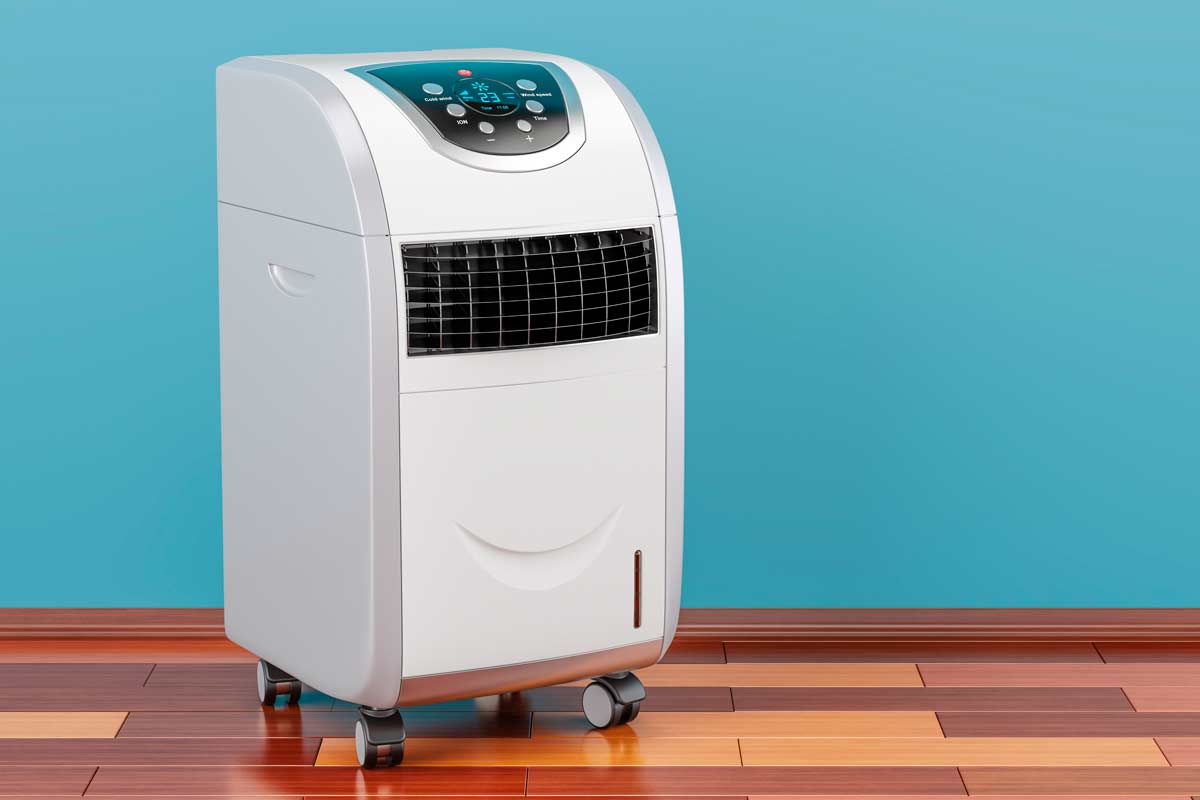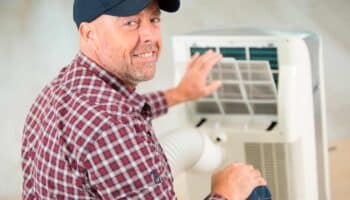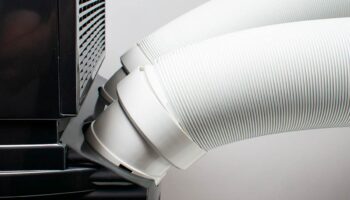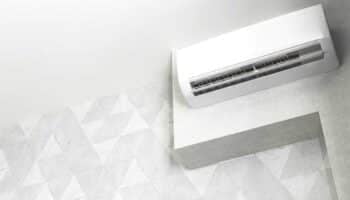We've independently reviewed this article to make sure it's as accurate as we can make it.
To find out more about our article creation and review process, check out our editorial guidelines.
Are you wishing your portable air conditioner could work a little better?
Maybe make the air even cooler, and even run a little quieter?
Let’s talk about what you can do to make your portable air conditioner colder — or at least run more efficiently. The more efficient your setup, the better and quieter it will run, and the better it runs, the cooler your home.
You can make your portable air conditioner colder by optimizing your installation and settings and by keeping up with regular maintenance. This may include adjusting and or sealing your hoses, limiting heat gain by covering your windows, closing your windows, adding insulation, and more.
The environment your air conditioner runs in has a lot to do with how well it cools your home.
What to do When Your Portable Air Conditioner Isn’t Cold Enough…
As mentioned above, the environment surrounding your portable air conditioner has a lot to do with how well it will cool the area. So the following will discuss some environmental issues, as well as adjustments you can make to the air conditioner itself.
1- Make Sure it’s Sized Properly
There may not be a lot you can do about this one, but if your air conditioner isn’t big enough to cool the area you’d like it to, it will struggle.
For example, here are some basic guidelines.
| Area to Cool | Number of BTUs |
|---|---|
| 0 to 299 sq ft | 8000 BTUs |
| 300 to 500 sq ft | 10,000 BTUs |
| 501 to 700 sq ft | 12,000 BTUs |
So if you have an 8,000 BTU air conditioner and you’re trying to cool a space of 700 sq ft, unfortunately, you’re limited in what you can do. However, following all of the suggestions below can still prove beneficial.
2- Make Sure Your Air Conditioner is in the Best Location
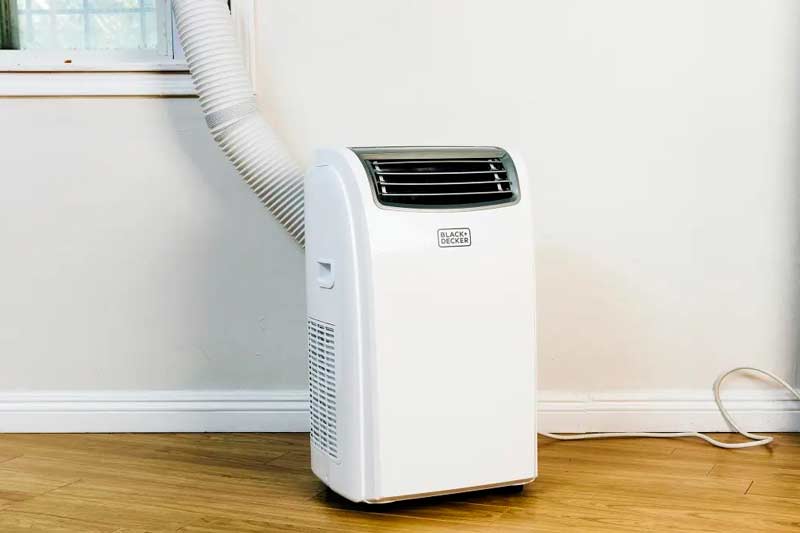
This one can lead to a bit of a conundrum. All recommendations for portable air conditioner placement say to put it close to a window. And this makes sense since the drain hose typically goes out the window.
However, windows come with sunlight, and having your air conditioner sit in direct sunlight is a bad thing. Add to that you also need a nearby electrical outlet, so meeting these three criteria may be a challenge.
However, in a perfect world, here’s the proper location for your portable air conditioner.
- Close to a window
- Close to a power outlet
- Out of direct sunlight
- In a room appropriately sized for the air conditioner’s maximum BTUs — see the table above
- Don’t put it in a room with a lot of heat-generating electronics or appliances
A little more on that last point. You don’t want your air conditioner to have to compete with anything that’s generating heat. And while the sun blasting through the window is pretty obvious, some other things are not.
For example, a TV of any size will generate heat. So if you have your TV on all day, your air conditioner is competing with it. The same thing could be said for running your vacuum cleaner or any other appliance.
Likewise, if there’s direct sunlight on the window then you’d want to block that out to help keep the room cool. While the air conditioner isn’t going to be helped by being in the sun, having that sunlight also shine straight into the room is also going to make your AC work a lot harder!
The answer is simple. Don’t add heat to a room your air conditioner is trying to cool — except for your hot self, of course!
3- Adjust and Seal the Exhaust Hose If Necessary
The job of the exhaust hose is to move as much warm air out of the room as possible. Help it along by doing the following.
- Make sure the exhaust hose is as straight as possible. The more twists and turns it makes, the more it has to work to move air efficiently.
- While you can buy extension hoses, the longer you make the hose the less efficient it is. The recommendation is that your hose shouldn’t be any longer than about 9 or 10 feet.
- Consider insulating the exhaust hose. This will help minimize the amount of heat that’s transferred back into your living environment from the hose.
- Seal around the hoses to make sure no hot air is releasing back into your home.
4- Make sure You’re Using the Right Vent Kit
Most portable air conditioners come with a window kit, but you need to make sure it’s the right type of kit for your window. If you have casement windows, a kit designed for sliding windows will not work.
Fortunately, you can purchase aftermarket kits that will best suit your windows. Check the videos below for installation options.
If you want to get any replacement part – or see how much one would cost – click to enter your model number in the search bar below. Our partners at AppliancePartsPros stock almost every part with free guides on how to install them.

5- Keep up with Air Filter Maintenance
Air filters may seem like they’re flimsy and therefore unimportant but, in fact, they’re one of the most important components of your air conditioner.
A filter that has a thick layer of dirt will reduce or completely block airflow and in turn reduce the unit’s ability to cool your home. If left long enough, your fan motor could burn out, your coils could freeze up, or your air conditioner will just shut down and no longer work.
Ironically, while your air conditioner is working harder and costing you more money to run, it’s no longer cooling your home. In some cases, it may even be pushing warm air out instead of cool air.
- Every manufacturer has guidelines for filter maintenance. However, it’s a good idea to change your filter monthly during the cooling season.
6- Close Your Windows and Doors
Letting heat in while you’re trying to cool your home is counterproductive.
There aren’t many portable air conditioners on the market that will cool an entire home — unless you’re in a small to mid-sized apartment. There are a few 14, or 15,000 BTU units that will cool an area of about 900 square feet, but that’s it.
If you have a larger AC, and you’re trying to cool your entire space, it’s important to keep all your windows and exterior doors closed. Your AC simply can’t fight against the warm/hot air coming in and circulating around your home.
The same applies if you have a smaller AC just to cool a smaller room. If you have a window or door open in another area of the home, it can still impact your little air conditioner off in its own room. So keep the door to that room closed.
- Don’t allow hot air from outside to compete with your air conditioner. If you’re trying to cool an individual room or space, keep doors between that space and the rest of your home closed.
- This won’t work perfectly as the cool air will create a negative pressure that wants to balance out with the hot air in other rooms, but it should help. Especially if you can add air blockers, like a door snake and sealing any drafts.
7- Don’t Wait Too Long to Turn it On
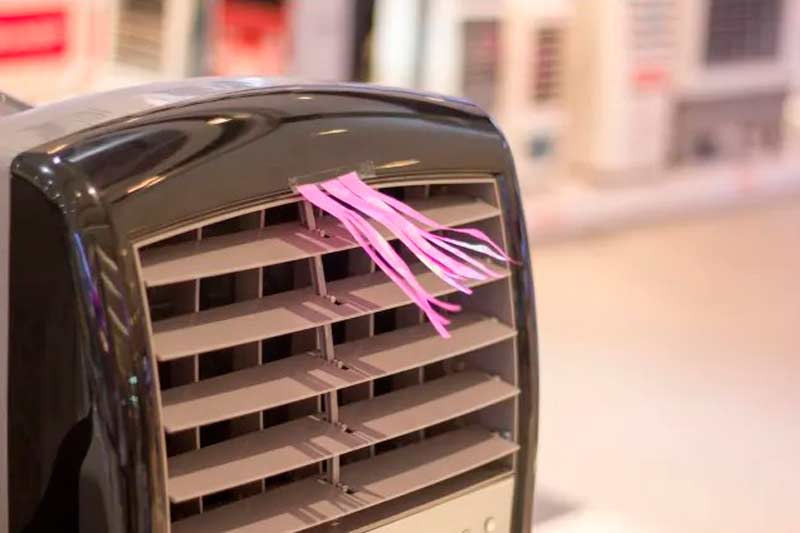
Your air conditioner works hard to cool down your room — don’t make it work harder than necessary.
This includes turning it on before your home gets broiling hot. The hotter your room, the harder it is to cool it down. Instead, pay attention to the weather reports. If you know there will be a spike in temps, turn your AC on before that happens.
- You could consider doing a test and seeing which works best for you both in terms of comfort in cost. Let your air conditioner run 24/7 and see if you notice a change in your comfort level.
- You can also try switching your air conditioner on in the morning and letting it run until you go to bed at night. Either of these scenarios is better than waiting until you’re already hot, and then turning on your air conditioner.
- If your air conditioner has a timer function and you’re able to program it, set up a program that works best for you.
8- Allow for Enough Air Circulation
You often see it recommended to put your portable air conditioner in a corner. I understand that this may be a good idea in terms of safety — it’s not sitting in the middle of the room for someone trip over it — but it’s a bad idea when it comes to the efficiency of your air conditioner.
And anything that impacts the efficiency of your air conditioner means that it won’t get as cold as he would like it to.
Remember that your air conditioner is always pulling hot air from the room before cooling it and returning it. If you don’t have it sitting somewhere where air can flow freely it’s going to negatively impact you in two ways.
First, it won’t be able to access enough warm air to pull it out of the room, and second, when it tries to return cool air that air, it may not be able to circulate freely depending on where you have your air conditioner sitting.
Here are some best practices for efficient air circulation.
- Do not put your portable air conditioner in a corner
- Don’t put it too close to the wall
- Avoid putting it behind furniture
- In general, don’t place your air conditioner close enough to anything that will block the air inlets and stop it from pulling hot air from your room
Additional Tips to Maximize Your Portable Air Conditioner
Still want to make your portable air conditioner a little bit colder? Assuming you’re already doing all of the above and you’ve chosen the optimal AC settings for your home and climate, try implementing these strategies which should help keep your entire home cool on even the hottest days.
- Assuming you’re trying to cool a larger area, such as an entire apartment or smaller house, put your air conditioner in a central location.
- Next use some powerful, energy-efficient fans. You can try placing one to the right and another to the left of your unit so that cool air can be picked up and spread in both directions.
- Consider placing additional fans throughout your home that can pick up the airflow and distribute it to where you want. These could be smaller tabletop fans. If you have a ceiling fan or a ducted furnace fan, that’s a bonus.
- If you want to get really scientific about it, you can use a small handheld anemometer to measure wind speed and direction in your home.
The key is using multiple fans and strategically placing them or mapping them so that you’re distributing the air conditioner’s cool air throughout your living space.
Conclusion
You can’t make your portable air conditioner magically colder than it already is. To some extent, it depends on how powerful your air conditioner is. Having said that, there are things you can do to help facilitate the functioning of your air conditioner.
We’ve discussed several steps that will help your air conditioner run more efficiently which possibly translates into running colder. They are:
- Make sure it’s sized properly
- Make sure your air conditioner is in the best location
- Adjust and seal the exhaust hose if necessary
- Make sure you’re using the right vent kit
- Keep up with air filter maintenance
- Close your windows and doors
- Don’t wait too long to turn it on
- Allow for enough air circulation
And then we added the additional tip of adding fans to your setup to extend the area that your air conditioner will cool on its own.
Hopefully, implementing any or all of these suggestions will lead to you having a cooler summer.
Thanks for reading through. While you’re here, why not take a look at some of our related posts below? Perhaps there’s something else we can help you with.
